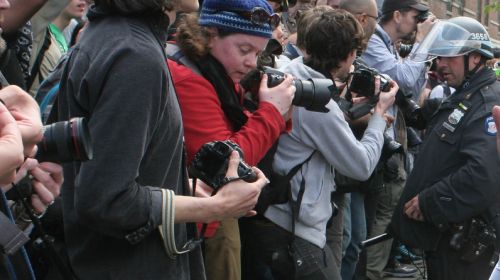
This past week we saw a strong step forward on photographers‚Äô rights in Washington DC: a groundbreaking General Order issued by the DC police chief as part of the settlement of an ņŌįń√ŇŅ™ĹĪĹŠĻŻ lawsuit. This is the latest in the ņŌįń√ŇŅ™ĹĪĹŠĻŻ‚Äôs ongoing effort to fight for the rights of photographers‚ÄĒespecially the right to record police‚ÄĒin courts (and courts of public opinion) around the country.
The funny thing is, I actually do have some sympathy for the police on the issue. Nobody likes to be subjected to constant photographic surveillance, in their workplace or anywhere else. The reasons that this is true are precisely the reasons why we oppose pervasive public video surveillance of American life, and many other surveillance policies.
The fact that police so regularly find it intolerable for a lone photographer standing on a sidewalk to be training a camera on them shows that police officers inherently recognize what we’ve been saying for years: surveillance and recording is a form of power. The actions of some police officers can be explained (though not justified) by the fact that they seem to find that power a challenge to their authority when wielded by a bystander.
Adding to the complicated dynamics underlying this issue is this: in polite society, it is just rude to point a camera at people, and persistently photograph them, especially if they ask you to stop. Most people would not do that to their friends and neighbors. I have previously discussed the line between law and social expectation, and photographing police in some situations can fall on the wrong side of that line.
But in the end, a recognition of these dynamics does not lessen one bit our determination to defend photographer’s rights.
First of all, photography is truly a means of self-expression and as such receives the full protection of the First Amendment.
Second, we give our police enormous powers over other citizens. And unfortunately there has always been regular abuse of those powers on the part of some officers. And so police must learn that along with the unique and significant powers and discretion that society invests them with, comes the responsibility of being subjected to photography, which is vital check and balance on those powers. Surveillance is a form of power, but increasing citizen power over police in that way is appropriate and, ultimately, good for everybody. (It is not appropriate or good to increase government power over citizens through surveillance, however.)
Of course we have also seen many in which police officers harass people not for recording the police, but merely for photographing buildings, trains, or other facilities, and the dynamics I‚Äôm talking about here have nothing to do with those abuses. That‚Äôs just a symptom of ‚Äúsuspicious activity reporting‚ÄĚ mania and widespread police trainings about how photography is supposedly inherently suspicious‚ÄĒeven though security experts say this is (as we also discuss here and here). (For example, a pamphlet entitled ‚ÄúThe Seven Signs of Terrorism‚ÄĚ includes as its number-one sign, ‚ÄúSurveillance,‚ÄĚ which ‚Äúmay include the use of cameras.‚ÄĚ This approvingly shows a citizen reporting, and a police officer approaching, a man taking photos from a bridge.)
Photographers absolutely should not be shy about exercising their First Amendment rights to the fullest. But it can also be helpful to have a sophisticated and sensitive understanding of the dynamics at work when they do so.

